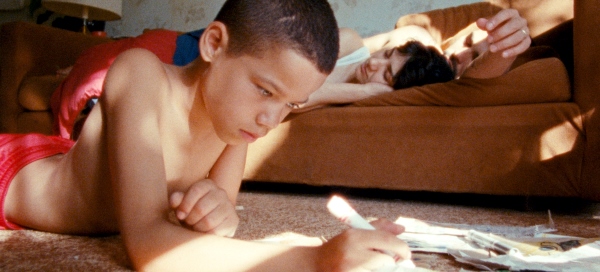![]() While there is no shortage of coming-of-age stories on film, We the Animals stands out for its kinetic style and raw emotion. Filmmaker Jeremiah Zagar’s fictional debut starts off with a montage reminiscent of the opening to Danny Boyle’s 1996 Trainspotting, albeit centered on a trio of boys. The camera can barely keep up with brothers Jonah (Evan Rosado), Manny (Isaiah Kristian), and Joel (Josiah Gabriel) as they run roughshod through their working-class neighborhood and the woods nearby. As the pace eventually slows down, the film reveals the world mostly through the eyes of Jonah, the youngest sibling, yet the intensity never lags.
While there is no shortage of coming-of-age stories on film, We the Animals stands out for its kinetic style and raw emotion. Filmmaker Jeremiah Zagar’s fictional debut starts off with a montage reminiscent of the opening to Danny Boyle’s 1996 Trainspotting, albeit centered on a trio of boys. The camera can barely keep up with brothers Jonah (Evan Rosado), Manny (Isaiah Kristian), and Joel (Josiah Gabriel) as they run roughshod through their working-class neighborhood and the woods nearby. As the pace eventually slows down, the film reveals the world mostly through the eyes of Jonah, the youngest sibling, yet the intensity never lags.
The main sources of conflict in his life are his relationships with his parents and siblings. His father, Paps (Raúl Castillo), who is Puerto Rican, and mother (Sheila Vand), who is white and whom the children refer to as Ma, run hot in the best and worst ways: they’re sometimes crazy in love and sometimes at each other’s throats. As for Jonah’s dynamic alongside Manny and Joel, the latter two resemble Paps in their wild, carefree natures. While they go running full-tilt into a lake, leaping headfirst into the water, the wide-eyed and sensitive Jonah sticks close to both shore and Ma, who coddles him and makes him swear to stay nine years old forever.
Of course, nothing can stay as it is, and the event that changes everything occurs during that fateful visit to the lake. Things become heated between Paps and Ma, resulting in the children being left more or less to their own devices while Paps is gone and Ma remains secluded in bed. At first, they retreat into a world of the imagination, but that gives way to the cold, hard reality that in order to eat, they must resort to stealing. As time passes, the two older brothers become more emotionally calloused, while Jonah turns further inward toward writing and art. The brothers also have a chance encounter with a neighbor’s tow-haired grandson, who stirs up powerful feelings in Jonah, which given the heteronormative household he has been raised in, he is half fearful of.
Zagar shot the film on grainy 16mm stock, which combined with the loose narrative structure, rapid-fire editing, and abundance of rattling camera moves, results in a rawness that feels like watching a home movie. At the same time, he has a knack for dreamy underwater visuals that pop up whenever Jonah finds himself overwhelmed by his own emotions. These scenes equate the panic he feels in being confronted by the sensations of love and attraction with literal drowning. Given that his movements are slowed by the water, such sequences also represent the few moments in which the pacing ebbs from its usual abundance of restless energy and thus grab our attention.
Another way the director takes us into Jonah’s interior space is through animated sequences in which scratchy yet colorful drawings are vividly brought to life. The images evolve from something wholly innocent to an at-times disturbing reflections of Jonah’s confused feelings about his parents, his siblings, and his own burgeoning sexuality.
We the Animals boasts strong performances all around, especially Rosado as Jonah, whose youthful brow seems to grow ever more furrowed as the mysteries of adolescence gradually make themselves known. He is also thoroughly convincing as someone harboring a secret that only gets heavier in his heart and mind, though that leads to an emotionally satisfying catharsis. Meanwhile, Vand and Castillo each bring combustibility to their roles as the parents, but to the credit of screenwriters Daniel Kitrosser and Zagar, Paps, though shown to be a brute, also has moments of sincere tenderness with his children. Ma, meanwhile, is alternately the victim and instigator of emotional and physical violence upon those around her.
As previously mentioned, this film tells a coming-of-age story, and per the tropes of such a tale, there is indeed a hero’s journey, though who he attempts to rescue proves to be a surprise. Ultimately, We the Animals has verve to spare, but it’s also full of empathy and heart.







Leave A Comment